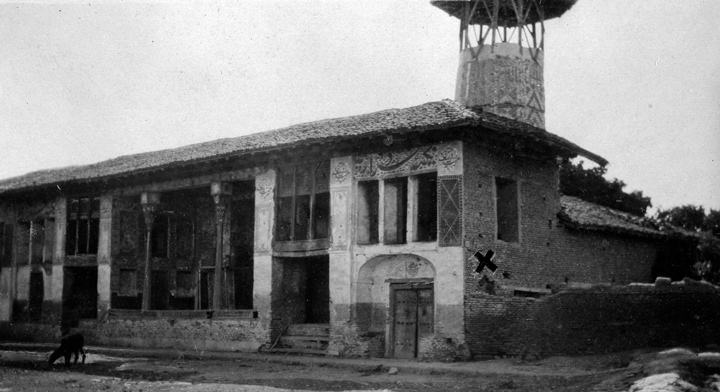The views expressed in our content reflect individual perspectives and do not represent the authoritative views of the Baha'i Faith.
Here at BahaiTeachings.org, no doubt you’ve read sentences beginning with “Baha’u’llah said” “Baha’u’llah wrote”, and “Baha’u’llah taught.” But just exactly who is Baha’u’llah?
What authority does Baha’u’llah have? What did Baha’u’llah teach? Where did he come from, and what makes Baha’is revere him as a messenger of God?
Here’s a brief attempt to answer these important questions.
The Holy Books of all the major world religions contain numerous prophecies concerning the coming of a messianic figure. This messianic figure, the prophecies variously say, will appear at “the Day of Judgment,” “the Day of God,” the “Time of the End,” or the “End of the World” – all to establish the kingdom of God on Earth. Each religion has a different title for this messianic figure, but they all predict his appearance and the tremendous positive impact his mission will have on humanity.
Christians await the second coming of Christ. Jews await the Messiah. Muslims await the Mahdi. Buddhists await the Maitreye Buddha. Zoroastrians await the Shah Bahram. Hindus await the Tenth Avatar of Krishna. Even the Indigenous religions native to the Americas contain prophecies concerning the coming of a messianic figure. For example, the Shoshones await the Great Redeemer.
If these prophecies are interpreted literally, they conflict with each other, and they conflict with science and reason. However, if they are interpreted symbolically, not only do they agree with science and reason, but they all fit together perfectly, as the notes and movements in a Beethoven symphony.
Baha’u’llah’s Two Bold Claims
All of which leads us back to Baha’u’llah, who made two very bold claims. First, he declared he was God’s messenger for the next one thousand years, having the same divine authority, the same Holy Spirit, the same divine power, as Moses, Christ, Muhammad, and the other founders of the major world religions:
In the East the light of [God’s] Revelation hath broken; in the West have appeared the signs of His dominion. Ponder this in your hearts, O people, and be not of those who have turned a deaf ear to the admonitions of Him Who is the Almighty, the All-Praised. Let the Breeze of God awaken you. Verily, it hath wafted over the world. Well is it with him that hath discovered the fragrance thereof and been accounted among the well-assured. – Baha’u’llah, Tablets of Baha’u’llah.
This station, by itself, makes the Baha’i Faith the youngest of the major world religions.
Baha’u’llah made a second and even more challenging claim. He declared he was the promised world messiah foretold in all the prophecies, in all the holy books, of all the religions of the world – the one promised to come on the Day of Judgment, the Day of God, the Time of the End, the End of the World, to establish the kingdom of God on Earth.
Baha’u’llah declared this period in history as the Day of God, the Time of the End. His mission is nothing less than the establishment of this glorious kingdom – the unification of the entire human race into an all-embracing, spiritually mature world civilization based upon divine principles of justice and love, and whose watchword will be unity in diversity.
With this second claim, Baha’is believe that all of the religions of the world have been consummated and fulfilled with the coming of Baha’u’llah.
It may seem easy to instantly reject this two-fold claim. Indeed, because of his claims and teachings, Baha’u’llah was severely condemned as a heretic and was intensely persecuted, tortured, exiled and imprisoned for forty years.
His possessions were taken, his home was destroyed, he was ridiculed, stoned, and poisoned. He was thrown into a pitch black underground dungeon, which was icy cold, damp, infested with vermin. His neck was put into a heavy chain; his feet were put in stocks. He was in this condition for four months. He was exiled four times from Tehran in Persia to Baghdad in Iraq, to Constantinople to Adrianople in Turkey, to the terrible penal colony in Akka (across the bay from Haifa) in the Holy Land. He spent most of his life as a prisoner.

Yet, he did nothing wrong – rather, the Muslim clergy collaborated with the Persian and Turkish governments to do everything in their power to try to destroy what they felt was a very dangerous, fast-growing new religion, which challenged the dominance of old forms of both religion and government.
In spite of extremely intense persecution, Baha’u’llah never wavered. His followers increased. He wrote more than one hundred volumes revealing God’s plan for the achievement of a universal lasting peace.
Today Baha’u’llah’s teachings have spread around the world, and millions of people from all cultures, backgrounds, races and nationalities follow those teachings. But in the second half of the nineteenth century, they were revolutionary. Here are just a few of them: collective security, elimination of the extremes of wealth and poverty, elimination of prejudice of all kinds, equality of women and men, harmony of science and religion, independent investigation of truth without preconceived notions, the adoption of a universal auxiliary language, universal compulsory education, the establishment of a world parliament and tribunal, and above all, the total spiritual transformation and unification of the entire human race.
Baha’u’llah’s Tablets to the Kings
To proclaim his mission, Baha’u’llah wrote letters to all the monarchs and ecclesiastical leaders of his time: Napoleon III, Queen Victoria, Pope Pius IX, Czar Alexander II and many others. These monarchs and ecclesiastical leaders had total power over the masses. In Baha’u’llah’s Tablets to the Kings and Rulers, he informed them that the promised world messiah had come. He commanded them to peacefully unite and disarm. He warned them of the extremely grave consequences, not only for their kingdoms, but for the entire human race, if they failed to heed his command. He made it clear that irrespective of their response, the Will of God would prevail – that world peace is inevitable.
If the two-fold claim made by Baha’u’llah is true, as Baha’is believe it is, there can be no doubt that a major event has occurred in human history: the coming of a promised one to unite the human race and establish the long-awaited kingdom of God on Earth.

Everything in the Baha’i Faith revolves around this two-fold claim made by Baha’u’llah. To become a Baha’i means to accept those two claims as true – but Baha’is never impose their beliefs on others, so it’s up to you to investigate these bold claims and determine, for yourself, whether you believe them.
If, at any time in your life, you decide in your mind and heart that Baha’u’llah is indeed who he claims to be, you are a Baha’i, a believer in Baha’u’llah’s world-embracing mission to unify humankind:
The Revelation which, from time immemorial, hath been acclaimed as the Purpose and Promise of all the Prophets of God, and the most cherished Desire of His Messengers, hath now, by virtue of the pervasive Will of the Almighty and at His irresistible bidding, been revealed unto men. … O ye lovers of the One true God! Strive, that ye may truly recognize and know Him, and observe befittingly His precepts. – Baha’u’llah, Gleanings from the Writings of Baha’u’llah.
















Comments
Sign in or create an account
Continue with Googleor